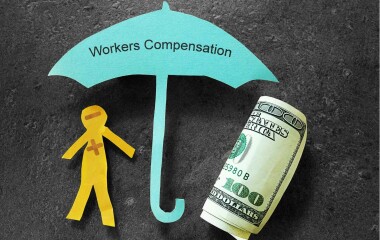Work-related injuries represent not only a health issue but also a significant legal and financial burden for all parties involved. When a work injury results in permanent consequences, the injured person is entitled to appropriate compensation. This article focuses on the topic of compensation for permanent consequences of a work-related injury, detailing the various types of damages, methods of calculation, and practical steps to secure fair redress.
Legal Framework for Compensation of Permanent Consequences of Occupational Injuries
The primary legal regulation governing compensation for occupational injuries is the Labor Code, which establishes the employer’s liability for damages incurred by an employee as a result of a workplace injury or occupational disease.
Permanent consequences of an occupational injury are assessed by a court-appointed expert. The expert evaluates the extent to which the injury has affected the employee’s health, lifestyle, and ability to perform everyday activities. Based on this assessment, the amount of individual compensations is determined.
Please note that the expert will also evaluate your health condition and lifestyle prior to the injury. Subsequently, they will establish whether the predominant cause lies with the injury sustained during work, and how the medical condition of the injured employee impacts the employee’s compensation claims.
Employer’s Exemption from Liability for Occupational Injuries with Permanent Consequences
The employer can be exempted from liability only in exceptional cases defined by law. Examples of reasons for exemption include the employee’s deliberate violation of safety regulations, provided the employee was properly informed about them, or intentional self-inflicted injury during work.
Occupational injuries are covered by the employer’s liability insurance, which every employer is required to obtain. Compensation payments are then handled by the relevant insurance company. To receive compensation, you must prove that your case truly involves an occupational injury.
Types of Compensation for Permanent Consequences of Occupational Injuries
-
Compensation for Loss of Earnings
Calculated as the difference between the average earnings before the injury and income after the injury (including pension).
The entitlement lasts until retirement age.
Even unemployed individuals are entitled if their unemployment was not caused by their own fault.
Compensation for loss of earnings is also due to employees who are unemployed, provided they did not cause the situation themselves. In such cases, the post-injury income is considered to be the minimum wage. This compensation can be paid until the employee reaches retirement age.
-
Compensation for Pain and Reduced Social Participation
Pain Compensation
This compensates for physical pain caused by the injury and its treatment. The amount depends on a point evaluation (the more severe the injury, the higher the compensation). The point evaluation is conducted by an expert medical assessor.
The total pain compensation is the product of the points and the value per point in the given year (which changes annually based on average earnings). Courts may increase this amount in justified cases. (More information on pain compensation)
Reduced Social Participation
This compensates for permanent consequences that limit the injured person’s involvement in life, work, education, and social activities. The expert determines the extent to which the individual’s normal life is affected by the consequences suffered in the occupational injury. (More information on reduced social participation)
-
Compensation of Treatment Costs
Includes treatment expenses not covered by health insurance, such as:
These costs must be reasonably incurred and directly related to the treatment of the occupational injury’s consequences. More information can be found here.
-
Compensation for Property Damage
Compensation for damage to or destruction of personal belongings caused by the occupational injury (e.g., clothing, watch, mobile phone). Imagine a reduction of your property due to the injury directly impacting your belongings.
Procedure for Claiming Compensation for Permanent Consequences of Occupational Injuries
Obtaining fair compensation requires a systematic approach:
-
Immediate Steps After the Injury
-
Ensure proper documentation of the injury and report it to the employer
-
Undergo medical treatment and all necessary care
-
Keep all medical documentation and receipts related to treatment expenses
-
After Stabilization of Health Condition
-
Request the treating physician to prepare a medical assessment for point evaluation of pain and reduced social participation
-
The assessment should be made after the health condition stabilizes (usually about one year after the injury for social participation evaluation)
-
Claim Submission to the Employer
-
Submit a written claim for damages along with the medical assessment
-
Provide other relevant documents (pay slips proving average earnings before injury, receipts of treatment-related expenses)
-
Negotiations with the Insurance Company
-
The employer forwards the claim to their insurer, who conducts its own assessment
-
If the claim is accepted, the insurer proposes the compensation amount
-
Negotiations or Legal Action
-
If the offered amount is insufficient, negotiations can be initiated or a lawsuit can be filed
-
For these cases, it is advisable to use the services of a lawyer specialized in labor law or injury compensation
Frequently Asked Questions (FAQ)
-
How long does compensation processing take?
On average, 2–6 months after submitting all required documents.
-
Do I need a lawyer?
Some cases can be handled independently, but for permanent consequences, legal representation is highly recommended.
Know Your Employee Rights
Compensation for permanent consequences of occupational injuries is a complex issue requiring sufficient knowledge of legal regulations and practical procedures. Timely and proper injury documentation, thorough medical care, and an active approach to asserting claims are crucial to obtaining fair compensation.
Due to the complexity of the process and the unequal position of the injured party compared to insurance companies, consulting a specialist in labor relations or injury compensation is often advisable. Investing in quality legal representation often pays off many times over in the form of adequate compensation, which can significantly help mitigate the impact of permanent injury consequences on the victim’s quality of life.
Contact Právo zaměstnance (Employee Rights)
Get professional help with occupational injury compensation:
📞 Phone: +420 773 014 007
📧 Email: info@pravozamestnance.cz
🏢 Via contact form
Social media:Instagram, Facebook, LinkedIn
We protect and enforce employee rights. We strive to improve the working environment for employees in the Czech Republic. We also support you in dealing with occupational injuries. For news, advice, and employee rights tips, we recommend our blog section or following our social media channels Instagram, Facebook, LinkedIn. Thank you.





